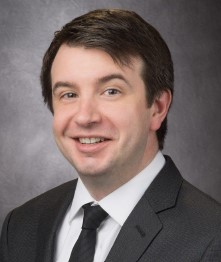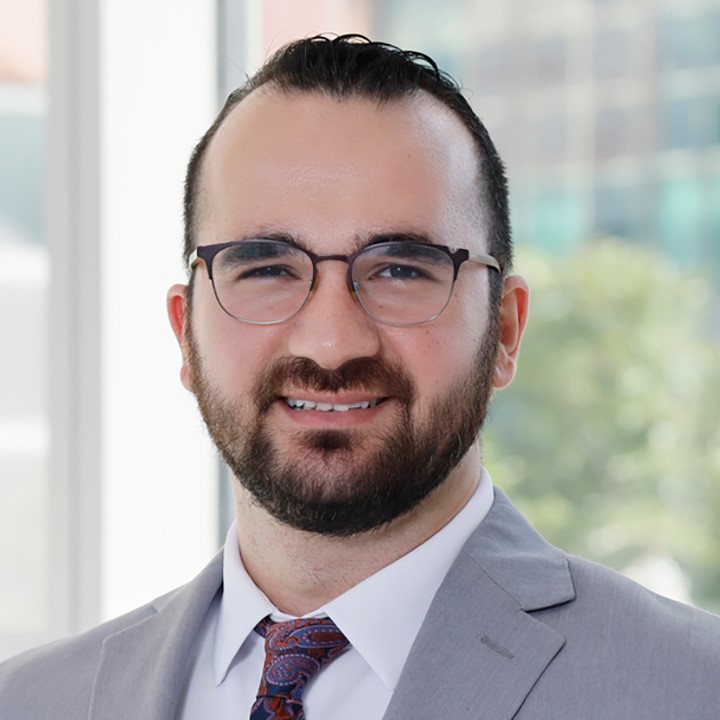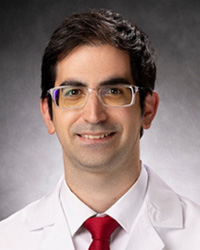Physician Scientist Training Program
The Internal Medicine Residency Training Program at UTHealth Houston is excited to support accomplished physician-scientists in their careers through the Physician-Scientist Research Track. This unique program allows residents with exceptional research and clinical aptitude to graduate in six years, encompassing two years of internal medicine training, two years of clinical subspecialty training, and two years of dedicated research training.
Interested residency applicant candidates can apply through ERAS (NRMP # 2923140C1) to be a part of the interview process. A comprehensive two-stage interview process will be initiated, involving relevant subspecialty departments and meetings with potential research mentors.
We also encourage interested internal current PGY1 residents to discuss this opportunity with program leadership.
Previous Short Track Graduates

Assistant Professor, Department of Thoracic/Head and Neck Medical Oncology, Division of Cancer Medicine, The University of Texas MD Anderson Cancer Center, Houston, TX
Carl Gay, MD, PhD
“As a physician-scientist with an already established interest in medical oncology, the opportunity to approach my Internal Medicine and Medical Oncology training via the American Board of Internal Medicine Research Pathway was invaluable to my career development. This track offered a streamlined curriculum that still afforded me all of the typical advantages of The University of Texas Health Science Center – Houston’s renowned educators and unparalleled array of public and private training settings, while also providing the flexibility to accelerate my clinical training and ensure unprecedented protected time in the laboratory to establish my scientific career and transition to faculty.”
Assistant Professor, Department of Thoracic/Head and Neck Medical Oncology, Division of Cancer Medicine, The University of Texas MD Anderson Cancer Center, Houston, TX

Dr. Elshad Hasanov serves as an Assistant Professor at the Ohio State University Comprehensive Cancer Center – The James, Department of Internal Medicine/Medical Oncology, and Principal Investigator of laboratory at the Pelotonia Institute for Immuno-Oncology
Elshad Hasanov, MD, PhD
“The residency program offers a unique training environment where you can master the fundamentals of internal medicine under the guidance of excellent teaching faculty. You’ll work with a diverse patient population and experience rare and common pathologies across various settings, including LBJ Hospital, VA Medical Center, Memorial Hermann Hospital, and MD Anderson Cancer Center. At the same time, you’ll have the opportunity to engage in cutting-edge research with esteemed leaders in the field.”
Assistant Professor at the Ohio State University Comprehensive Cancer Center – The James, Department of Internal Medicine/Medical Oncology, and Principal Investigator of laboratory at the Pelotonia Institute for Immuno-Oncology

Erez Baruch, MD, PhD
Erez Baruch, MD, PhD
Regarding my experience at UTHealth Houston, in my opinion, there are two critical qualities of the Physician Scientist Training Program track within the UTHealth Houston Internal Medicine residency:
Clinical training – as a physician-scientist, you will become a very sub-specialized clinician. It means, at least in oncology, that you’ll see very sick patients, many times with refractory disease and complications of previous treatment lines. Since the fellowship period is research-oriented, and the IM residency is only two years, those two IM years must be clinically heavy. Otherwise, you won’t know enough medicine to treat those sick patients. The UTH residency is clinically heavy and diverse, with lots of ICU months in both a tertiary hospital and a county hospital; you will not get a lot of time in the lab even though that’s what you love and want. But in UTH, just like in the Rolling Stones’ song – you don’t get what you want, you get what you need.
Mentorship – UTH sits in the heart of the Texas Medical Center (TMC) – a conglomerate of hospitals and research facilities. The research opportunities at the TMC are endless. For example, my research during residency was done at MD Anderson Cancer Center, and a portion of the ambulatory block can be spent at MDACC’s clinics. Moreover, there is a very high chance that during your clinical rotations, you will meet a senior mentor who has similar life circumstances to yours and could help you build your career from a very early stage. For me, it was Dr. Cesar Arias. Even though he is an ID specialist and does not do any research in oncology, his insights regarding my career development were priceless. Dr. Arias is now at Methodist while I am at MDA, but I am still proud to be his mentee.
Medical School: Sackler School of Medicine
Residency: McGovern Medical School at UTHealth Houston
Current 2nd year Hematology/Oncology Fellow at MD Anderson Cancer Center